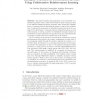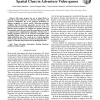370 search results - page 13 / 74 » How to Control Emergence of Behaviours in a |
CEFP
2005
Springer
14 years 1 months ago
2005
Springer
This chapter describes Hume: a functionally-based language for programming with bounded resource usage, including time and space properties. The purpose of the Hume language design...
BERTINORO
2005
Springer
14 years 1 months ago
2005
Springer
Abstract. This paper describes the application of a decentralised coordination algorithm, called Collaborative Reinforcement Learning (CRL), to two different distributed system pr...
AAAI
2006
13 years 9 months ago
2006
Although anticipation is an important part of creating believable behaviour, it has had but a secondary role in the field of life-like characters. In this paper, we show how a sim...
VAST
2004
ACM
14 years 29 days ago
2004
ACM
In current city visualisations crowds are being included to increase realism in the scene. With the self-steering nature of crowds it is traditionally difficult to control the nu...
IJVR
2008
13 years 7 months ago
2008
This paper proposes the use of animal flocks to naturally provide spatial clues in adventure video-games. This approach complements the so far proposed mechanisms to support naviga...


